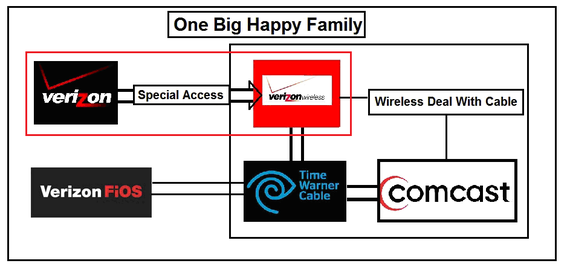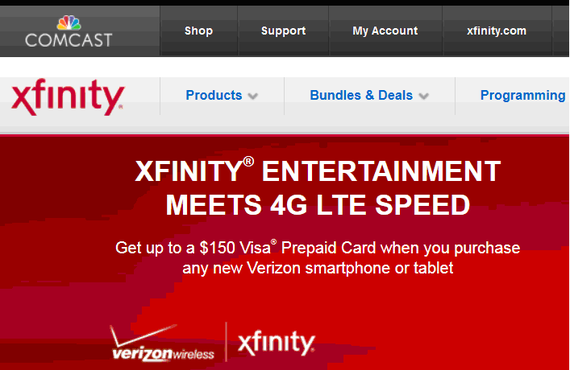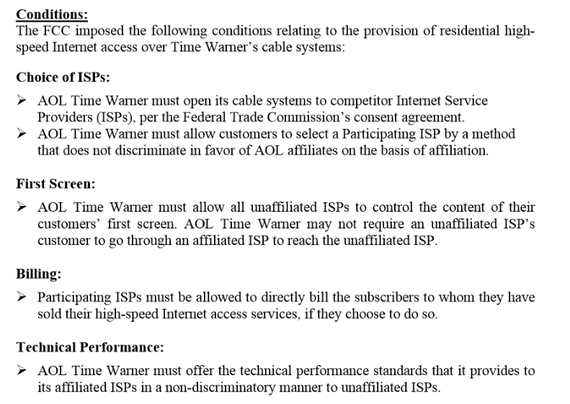Open the Networks for Direct Competition: The AOL-Time Warner Merger was Never Enforced.
Verizon's Wired Networks and Comcast and Time Warner and Verizon Wireless
There are relationships and financial ties between Verizon's wired-business and Verizon Wireless, as well as Verizon's deal with Time Warner and Comcast that are complicated, twisty, multi-layered and reveal a nasty underbelly -- and it is just another reason why the Comcast-Time Warner merger will harm all of the states where Verizon is the incumbent phone company that controls the wires.
Verizon Wireless and Comcast Marketing, July 6, 2014
If we overlay Verizon's FiOS deployments, Verizon's plan to shut off the copper and replace it with Verizon Wireless, and the deal Verizon has with Comcast and Time Warner today--for one state, New York, we find that:
- FACT: Verizon's FiOS is a brand name of cable, phone, and high speed Internet service that rides over a FTTP, Fiber-to-the-Premises, telecommunications line.
- FACT: Verizon FiOS is only going to be in 20% of New York State's municipalities and that creates a 'duopoly', at best between Verizon and Time Warner for cable, broadband and phone service. (In New York State, Time Warner is the major cable incumbent, but Comcast has a presence.)
- FACT: 80% of the State's municipalities will have a monopoly service from Time Warner and/or Comcast, the cable provider, on cable and broadband.
- FACT: Verizon announced that in areas that are not upgraded with FiOS, the company plans to 'shut off the copper' and offer Verizon Wireless services.
- FACT: Verizon Wireless is in bed with Comcast and Time Warner and the advertisement above outlines that instead of competing, Verizon Wireless will be colluding to sell their service in 1 bundle with either Comcast or Time Warner.
- FACT: Verizon Wireless is also in bed with Verizon New York's special access-wired services.
- FACT: Wireless can't compete with cable for cable service.
Special Access: The Secret Wired Networks.
We've written a separate article about special access using the new report, but essentially, there is a hidden network of wires and services, known as special access, that are mostly broadband and data lines to businesses that have a speed of 1.5 mbps or more in both directions. There are much larger configurations where the wires that go to the wireless cell towers, hot spots and broadband networks and are used by large competitors, such as Sprint, (and these are sometimes called "back haul").
Verizon and AT&T have a monopoly on these hidden networks in the states where they are the incumbent utility, and special access has obscene profit margins, and it is one of the reasons America's broadband is slow and expensive, as the companies have been able to keep control of these networks, to the detriment of all users and competitors.
But here's the secret -- in areas where Verizon is 'shutting off the copper', it isn't shutting off the 'special access wires' that were laid as part of the wireline networks and used by the wireless company -- and Verizon Wireless is getting special advantages over all other competitors who will be using these networks as well.
The Ties and Advantages of Verizon Wireless -- In tracking Verizon New York's fiber optic deployment it is clear that:
- Verizon Wireless' 'fiber to the cell towers' is part of the wireline expenses.
- Verizon Wireless appears to be paying a fraction of what other competitors are paying for the use of the 'special access' services.
- Moreover, Verizon is transferring 'utility customers' to Verizon Wireless -- for free, while other companies would have to pay hundreds of dollars in acquisition fees of new customers.
- Verizon can claim losses that are caused the wireless company's financial perks - ie, added expense from paying for the wireless fiber lines or the wireless company not paying its fair share, thus lowering the wired revenues.
Verizon Wireless/wireline make money on every wireless call -- Because Verizon controls the special access wires and has inflated rates for competitors, then it knows that it will get revenue from everyone who goes to wireless, regardless of the company.
Verizon hedged its bets with cable -- Even though Verizon has not upgraded 80% of the municipalities, it has been continuously putting in 'special access wires' especially used by Verizon Wireless. So, if Verizon 'shuts off the copper', it still keeps the special access services online.
- The deal with the cable company to move these customers onto the cable companies' triple play while supplying them with Verizon Wireless -- is part of Verizon's calculation of whether they should upgrade the networks to fiber optics is specific locations.
- Verizon-wired New York is always part of this equation as their 'special access' services are part of the Verizon Wireless plan as well.
So we have:
"Verizon New York-wired and Verizon Wireless and Comcast and Time Warner all working together already."
Making Time Warner and Comcast larger doesn't bring more competition and reinforces the 'DO NOT COMPETE" status today with Verizon Wireline and Verizon Wireless. There can't be lower prices when the wireless company is colluding with the wired company who has a deal with the cable company. And this is not competition. Last time I looked you need more than two companies to be called 'competition'. In New York, 80% of the municipalities will be a cable monopoly product -- and if the merger goes through, by only 1 company.
This is an anti-trust case waiting to happen.
Open the Networks for Direct Competition: AOL-Time Warner Merger was Never Enforced.
Few know that the original AOL-Time Warner merger , circa 2001, required Time Warner to open its networks so that there would be high-speed Internet competition from other ISPs using the Time Warner networks.
During the merger, the FCC specifically stated that not opening the networks to competition would essentially cause what we call today, Net Neutrality.
Conditions were imposed to open the cable networks to direct competition as part of the merger conditions.
This failure to have the cable networks opened to competition as a condition of the merger is proof that whatever merger requirements are put into the Time Warner-Comcast merger, they are a waste of time, will not be enforced, and whatever was promised is simply a broadband-carrot to close the deal.
Instead of allowing the merger, we should be asking about the collusion of the wireline-wireless-cable companies and whether it is time to start to reopen the networks to direct competition -- and solve Net Neutrality.
Coda: In our previous article we addressed the "Social Contract". In 1995, the FCC created the "Social Contract", which was an actual agreement with Comcast and Time Warner that allowed them to raise rates up to $5.00 a month, and in exchange they would upgrade their networks for broadband and Internet and supply high speed Internet service to all schools in their area.
Update: In recent testimony by Comcast and Time Warner in New York State pertaining to the merger, neither company mentioned that they had been wiring schools, something that they would have used as selling point for the merger.
To read our testimony, see:




